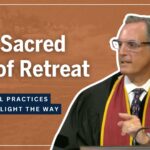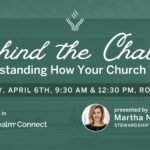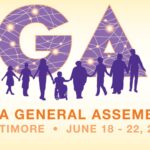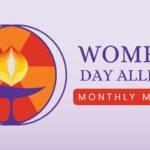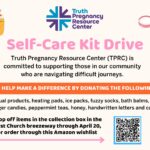Connection Sunday | Rev. T. J. FitzGerald | 09.24.23
What does it mean to be part of a wider community and what does it do for us as individuals? Maybe that’s where real power is. This is the second sermon in our Living a Purposeful Life series, during which we are exploring the spiritual inner work required to transform our personal lives.
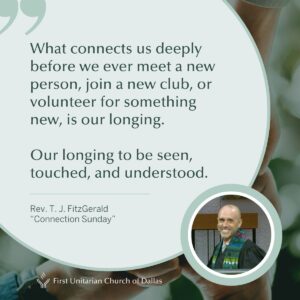
Sermon Transcript
A Warning About Loneliness from the Surgeon General
Well, I’ve been reading the news lately. I know. It might really be coming now, friends. It’s been barreling down on the nation like a runaway freight train, but it looks like it’s really coming. One side says we need more and more and the other side says, “You’ve had quite enough. Thank you very much.” The nation will soon be in a shutdown if we don’t fix it. It’s not just coming. In some ways, it’s here. This national deficit, it’s wide, the deficit. It’s been growing and growing for years the deficit. And of late, it’s almost taken on a life of its own.
It’s an emergency. Generals are getting involved, warning us of what it could mean for the future of this country, for the future of the world. The shutdown can only be averted if the national deficit of love is not fixed. It’s going to be that kind of Sunday, friends. I wish I was kidding, people, but the deficit, and that really literally is what it is between the social connection that people need to thrive and the social connection that people are getting, or not, that deficit is as wide and as far in our country as any social scientist can ever remember it being.
The Surgeon General, Dr. Vivek H. Murthy, and about 50 of his colleagues sent out a warning a few months ago in the form of an advisory action about loneliness in this nation. In it he warns loneliness and “is associated with a greater risk of cardiovascular disease, dementia, stroke, depression, anxiety, and premature death.” That’s right. You can all scoot a little closer to the person next to you in that pew if you’re feeling it. He continues.
“The mortality impact of being socially disconnected is similar to that as caused by 15 cigarettes a day, and even greater than that associated with obesity and the lack of physical activity.” I think we all hear what the good doctor, the great general is saying to us, get to church, people. We’ve got to stay connected, friends.
The Dangers of Living in the Margins & the Need for Community
Adrienne Rich tells us in her poem, Yom Kippur 1984, “Find someone like yourself. Find others. Agree you will never desert each other. Understand that any rift among you means power to those who want to do you in. Close to the center, safety. Toward the edges, danger.”
She’s talking about edges, margins in life and the danger that margins pose to those who occupy them. But her call if you listen close, her call isn’t to the people on the margin. If you listen, though she herself as a queer Jewish woman knows what it means to occupy the margins, no, no, her call is to the whole community, to any community that puts people in places where they might be dislocated, disjointed, disconnected, and disenfranchised, listen up, to remember the agreement, not to desert one another.
Toward the edges, danger. But not just to the edges, to the community by way of the edges. You hear that, right? Her poem is entitled Yom Kippur 1984 and it traces the ways that individuality and solitude intersect and interact with the powerful need for community in our lives. Yom Kippur is the day of atonement in the Jewish faith. A devoutly Jewish friend once shared with me what he was taught about the acts of atonement leading up to Yom Kippur in his community’s history.
Years ago, he told me when you wrong someone, before the day of Yom Kippur, you’d approach them usually best with witnesses and you’d seek to atone for the wrong you caused. The person would evaluate your sincerity, maybe look at what you’ve done to amend your behavior or make what was wrong right throughout the year and decide whether to forgive you or not. This could repeat again the following year if the atonement is not accepted.
But in the third year in the presence of the community, if the person who was harmed does not accept and the wider community believed that the person seeking forgiveness met the obligations to receive it, then it switches. That’s how it worked. The person who refuses to forgive is then the one in the wrong. Yeah, it’s elegant. My friend explained that most communities don’t have this kind of formalized ritual now, but back in the day it worked. It worked to prevent prolonged disconnection.
It worked to encourage pathways to truly righting wrongs. It worked to help keep a community together, when to fray its edges meant danger for the whole community. It worked to stay connected and we’ve got to stay connected, because loneliness is dangerous. This unmet need, this community deficit is a public health emergency.
The Role of Church in an Isolated World
Humans are not meant to be isolated. Isolation for all of human history has been a form of punishment. In extreme cases, a form of torture. We are built. We are knit together. We are composed to be and stay connected, to play a part in one another’s stories. We’re constantly being remade at the cellular level. We’re constantly being renewed and finding ways to reconnect with the world. I mean, we wake up every morning after being unconscious for hours. Maybe our magic box has taken our alarm clock. We have to figure out ways to reconnect. Our very makeup prevents a static, unchanging idea of connection. It takes renewal, revitalization of our relationships to do it.
But not everybody can. Sitting right here in this place or in a room somewhere connecting online right now, I guarantee you, because we as the ministers hear it all the time, I guarantee you sitting with us at this moment, someone is having the worst day of their life. They’re having one of the worst days of their life and they came to church. They’re on the edge of something in their life, on the edge of the community, on the edge of a relationship, maybe of a relapse. They’re on the edge, but they’re here.
And to that person, to those people, I tell you true, I get it. On the morning when I learned the greatest pain, greatest personal betrayal of my life, I remember it like yesterday. On that morning after feeling that pain, something in my body responded, let’s go to church. I put on my dress shirt, it was plaid, and my khakis and slunk myself the three blocks to All Souls from my apartment in New York City. I stayed for both services because that’s how we did it in my day. I remember the red velour seat cushions that were set in the cream-colored pews.
Those cushions were matted in places and lumpy. They weren’t in great shape. Neither was I. We were a good fit. The pews there were different. They went all the way up to about here on the shoulder. Well, I guess for most of you that would be here, but for me it was nice. In some spots in those pews, there were corners where the pews were divided so you could lean in there in a corner like a sturdy arm might hold someone when they’re sad. And that’s where I was held. That’s where I was held when nothing else could.
The truth I felt in my bones then is a truth many know. In despair, there’s nothing new. Humans have lost and lost and cried and lost again, all in the name of despair. When we are despairing, it’s hard to see what’s new and what’s growing in our lives. The great scholar of Hebrew scripture Walter Brueggemann says despairing people do not anticipate or receive newness. It’s like despair shuts off one of our core biological functions and we feel less than human.
Yom Kippur, along with all of the other exquisite rituals and rights, humans have hued from our shared history to reconnect with others are necessary at times. We need them not not because we’re disconnected from others, not because we’re disconnected from communities, because we’re disconnected in those times from our true natures, which are born of creation, nurtured in love, and be held as holy. Despair lives in the division and grows in that deficit between what we are striving to be and how we fear we are falling short.
Are We Connected?
That is the terrain, that is the distance of despair. In the margin, danger. Are we connected? Really, are we connected? How many devices are in our pockets and connected to millions more? How many ways are we connected to the internet and limitless information? Is the rise in these ways we connect related to this rise in loneliness and despair we hear about, that we see, or is it just a coincidence? Are we connected really?
I think I feel that we are, but I feel what connects us deeply and before we ever meet a new person, join a new club, volunteer for something new, what connects us is our longing, our longing that we have to be seen, our longing to be touched, our longing to be understood. That’s what connects us. Rich’s poem gets at it, this solitary being in a crowd. Nothing’s lonelier than being alone in a crowd. But without the connection, without our people, that longing grows. As helpful as it is to learn from our surgeon general, people of faith have known this for millennia.
Just read the Psalms, friends. But it’s always nice when science catches up with the church every once in a while. Cutting people off from society, keeping them from those they love, forcibly taking them away from their social connections has been a tool for oppression for millennia, has been a tool for extracting energy and labor for millennia, has been a tool of dehumanization and demoralization for millennia. Picking up what I’m putting down. Yom Kippur is just one of the ways that religious communities kept their people from the margins, kept their people from slipping away.
We’re only the inheritors, we’re only the keepers of thousands of years of wisdom, about how connection fights against the power oppression has and its tool, it uses despair. We know we are connected because it is our purpose as a church to be so. By opening and reopening our minds, our hearts, our beliefs about what is good and what is holy, more people are seen here. More people are touched by what is shared here. More people are understood here. More and more of those who come here are getting connected.
In case you don’t know it, in case you didn’t see it this morning, Sunday school in the other building is bursting at the seams. We’re starting to put them in the third chair here. For the record, that was my vote. I wanted them there. We are conscripting all of you to Sunday school service from now on. Happy Connection Sunday. For us, for Unitarian Universalists, our founding faiths flow from the ways our ancestors resisted, insisted, persisted until they could experience the holy in their own way.
Honoring Our Religious Heritage by Committing to Connection
Every great movement of our faith, most great movements of every faith have been born from finding more and more ways to welcome, more and more ways to love people into their full selves. If a church ever needed a purposeful life, that is a good way to start. Connection Sunday is a celebration of that religious heritage. Our ancestors knew what it meant to be on the margins and many of them paid with their lives for it. We learned through hard work and struggle that connection saves lives. We learned through pain and despair that connection saves lives.
We learned through watching the next generation come to our houses of worship burst at the seams flourish together, that connection is saving lives. You only got to hear one parent tell us that this is the only place their child can be themselves with others to know that connection is working here. That’s right. It saves lives because it connects us to the holy. Today, Connection Sunday is a celebration day of the gorgeous, creative, life-affirming ways the people that make this community care for one another and hold each other close.
It’s Connection Sunday and we are going to get connected. Is everyone ready? After the service, you can meet volunteers who are passionate. You can meet volunteers who are committed. You are going to meet volunteers who are going to sign you up for stuff until you can’t sign yourself up for anything again. Here at the church building, there are more than 24 groups represented out there and there are even more meeting online. Friends, we might be out of our damn minds doing this Sunday, but I’ll tell you one thing, we are out of our damn tables.
All the tables are being used today, but we do it anyway. We have got to because got to stay connected. Our faith knows what it means to be on the margins and to come back and be held. We’ve got to because we found a people we will never desert and we promised not to desert them either. We’ve got to because amor is the purpose of this church. It’s Connection Sunday, friends. Go to church. That’s all we got. Thank you.


